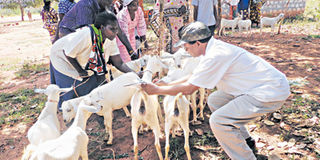Five reasons to be in farmers’ association are way to go

Vitengeni Women Group members in Kilifi last month when they received goats donated by an NGO. PHOTO FILE
What you need to know:
- Access to new technologies and information: Farmers’ organisations are crucial points of dissemination of information. It has been documented that most agricultural research and advisory services are channelled through the associations.
- These services include financial support from the government or private institutions. In addition, members can be selected to participate in development programmes, benefiting the farmers through acquisition of new skills and other incentives.
Most livestock farmers shy away from being members of associations.
A smallholder livestock keeper would rather go and sell his milk at the roadside as opposed to collection points run mainly by associations for better prices.
The good thing with associations is that they offer farmers the economies of scale. Unfortunately, livestock farmers are yet to understand the power of collectiveness and unity as pertains bargaining for higher prices for their produce.
The farmers lack information on potential markets and are sometimes stuck with their produce for weeks.
Last week during the Nairobi International Trade Fair, I had the opportunity to have a discussion with a registered poultry group, and surprisingly, they had been requested to supply approximately 200 trays of eggs per week to a certain company but due to lack of resources, they missed the opportunity.
If that was a collection of groups, the farmers would have certainly clinched the deal. Isn’t it strange that cash crop farmers have formed associations that have been working well for years yet this is not to be the case with livestock farmers?
What are the benefits of joining associations?
Easy access to markets: Associations are key in the value chain. They assist farmers to access markets and fetch good prices for their produce.
Bulk sale of produce is a major catalyst for good prices. For example, smallholder dairy farmers would benefit greatly from village dairy co-operatives as opposed to hawking their produce individually.
CHANELLED THROUGH ASSOCIATIONS
Access to new technologies and information: Farmers’ organisations are crucial points of dissemination of information. It has been documented that most agricultural research and advisory services are channelled through the associations.
These services include financial support from the government or private institutions. In addition, members can be selected to participate in development programmes, benefiting the farmers through acquisition of new skills and other incentives.
Drivers of change: Through the associations, farmers can come together to form a strong force to lobby for relevant policies.
In 2007, poultry farmers’ associations in partnership with the Ministry of Livestock Development formulated a National Poultry Development Policy, and they have been at the forefront lobbying for the adoption of this policy.
Access to funding: Associations can recommend their members to various financial institutions for loans. This would be advantageous to many farmers as expansion of their enterprises may have stalled due to lack of adequate funds. The groups can also give information on how and where to secure credit services.
Value addition: Farmers’ organisations do not only assist in the identification of markets but help in value addition. This can be offered in form of training or a common processing plant where farmers add value to their produce.
For instance, bee keepers associations are involved in the processing and packaging of their members’ raw honey before sale thus fetching higher prices.
Smallholder farmers are encouraged to become members of these organisations to reap and enjoy the fruits of their hard work.
Dr Muchunguh is a livestock expert, drmary.muchunguh@gmail .com




